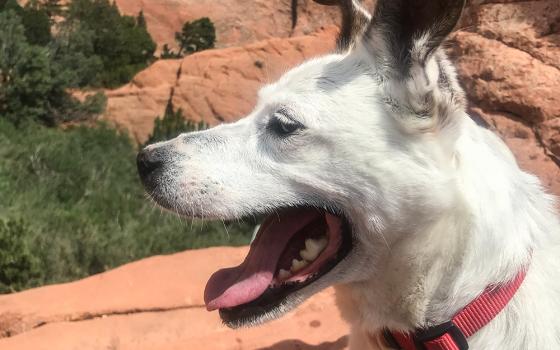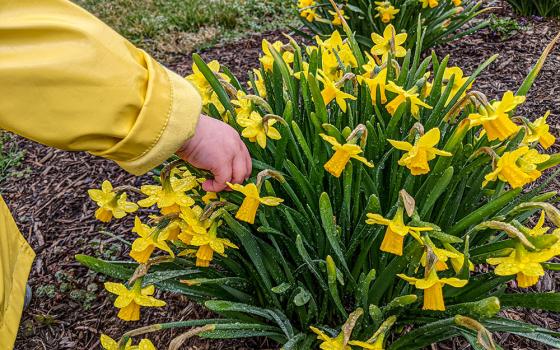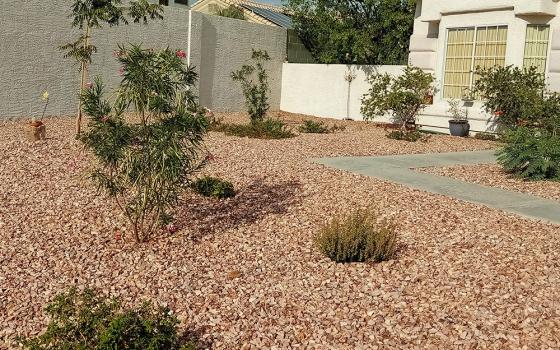
Mary Beth Keenan's daughter touches daffodils in their yard. (Courtesy of Mary Beth Keenan)
The combined power of "Bluey," the Holy Spirit and Google led us to our forest school. I was ruminating about where to send my sweet, COVID-19-pandemic child to preschool while watching "Bluey" with her one afternoon. My intuition knew it was time for her to experience preschool, yet I also suspected that we would struggle with the separation.
Enter Calypso (Bluey's teacher) and a mostly outdoor school, then a quick Google search and an answered prayer: We had a forest preschool within a reasonable distance from our house.
As a family, we value nature. We go to a Franciscan parish. We prioritize hiking and being outdoors during travel. We garden. My children and I have participated in the 1000 Hours Outside Challenge and almost all of our playdates are outside.
It made sense to send my 3-year-old to a school where she would spend most of the day outside. Not only is it developmentally appropriate, but it's also familiar and comfortable for her individually. I was excited and hopeful about forest school.
The transition to start the school year went about as well as I could have hoped, largely in part to the wonderful teachers and the community of human and nonhuman beings they have cultivated. Still, getting an exhausted 3 year old to share anything about her day on the way home from school proved difficult at first.
I eventually settled on asking just one question: Did you see any critters today? We both noticed around November that the usual sightings of newts, worm snakes and birds began to taper off.
We spoke as a family about what those friends might be doing as the weather turned colder, and made predictions about who would stay present throughout the winter. We were having daily conversations about the nonhuman members of our community — and we loved it.
Advertisement
This practice led us to dive deeper into the principles of Laudato Si', Pope Francis' encyclical on care of our common home, as well as diving deeper into the core values of the preschool. Actions that had once been just nice ideas became integrated into our family life.
The preschool believes that all living beings are unique creations and celebrates their inherent dignity. Francis speaks similarly in Laudato Si', saying, "The ultimate purpose of other creatures is not to be found in us. Rather, all creatures are moving forward with us and through us towards a common point of arrival, which is God."
As a family, we are intentional to speak of nonhuman beings with personal pronouns (him, her, them) or sibling language, rather than calling them "it." This seemingly simple linguistic change has helped us to see the individuality of each creature we come across. We are much more likely to move Brother Spider outside, rather than squish him. We consider what Sister Tree needs when pruning her to keep her as healthy as possible.
We also recognize that dirt and plants, not just animals, are part of our community. We do our best to be respectful of their dignity, as well. We compost our food waste. (It is up for debate whether the neighborhood racoons or bacteria in the pile get more to eat from our efforts, but at least the food reenters the circle of life.)
Our garden is mostly chemical free. We use coffee grounds, lime, calcium and toddler songs to help replenish what the soil might be lacking. We rotate what we grow in each raised bed and plant wildflowers for the pollinators. This can create unpredictable yields and frustrating moments, but we believe these are important realities of the natural world for our children to learn.

Mary Beth Keenan and her daughter on a hike in a forest near their home (Courtesy of Mary Beth Keenan)
Another core value of the preschool is to prepare children to be helpful, active members of their communities — to be a part of improving their world. In Laudato Si', Francis connects the cry of the Earth to the cry of the poor. We believe the forest school teachers do, too. Helping children hear the cry of the Earth at an early age will make them more attuned and empathetic to the cry of the poor as they grow.
As a school community, we did our best to answer the cry of the Earth at the end of last school year. Over the course of a few weeks of rainy weather, some stormwater detention ponds in the parking lot became home to a host of frog eggs and then tadpoles. As the days grew drier, so did the ponds.
Each morning, teachers and families would check on the tadpoles, concerned about their livelihood. One family brought a pop up tent to provide shade and slow evaporation, another brought a wheelbarrow to move muck and hose water to better spots. Finally, we brought in a small inflatable pool to create a non-draining pond of sorts.
Months later, we still talk about the tadpoles, wishing them well and feeling proud that we were able to help save some of them.
Often in this season of life, it does not seem that we are doing grand things to help the environment. But I trust that small acts will instill in our children that the natural world is not only worth caring for, but is also an integral part of our community. I hope that every spider and tadpole they encounter now inspires them to advocate for ecological justice as they continue to grow. Our faith and the forest school help lead us on this path.






